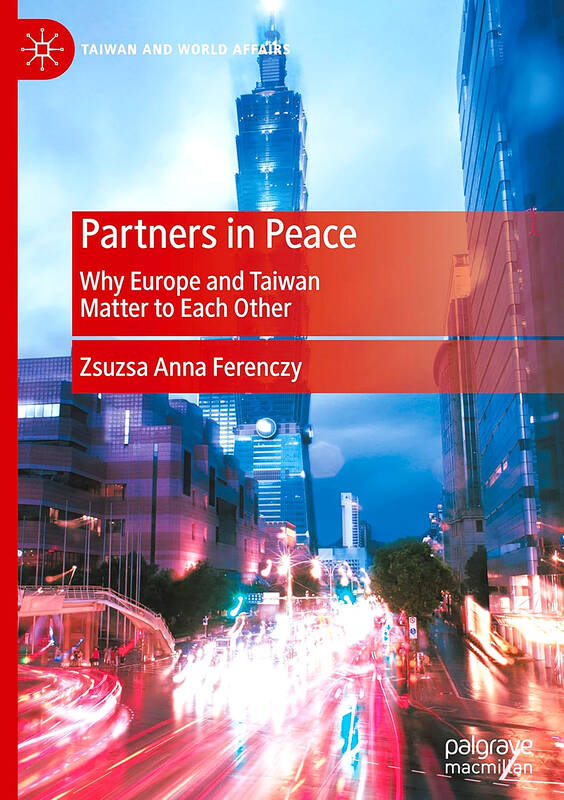So much has been written about burgeoning ties between Europe and Taiwan in recent years that a clear, concise book dedicated to the subject is long overdue. As part of a series titled Taiwan and World Affairs, this short volume by Zsuzsa Anna Ferenczy has plugged the gap in impressive fashion.
Drawing on 12 years of experience as a political advisor for the European Parliament, Ferenczy has also gotten to know Taiwan intimately during her four years as an assistant professor at Dong Hwa University in Hualien.
The former role, she notes in the book’s introduction, has given her not only “a deep understanding of the complexities of European policy-making” but also access to “the Brussels bubble” and academics, experts and officials across Europe. Regarding the Taiwanese perspective, Ferenczy emphasizes a similarly wide range of discussions across sectors that has informed her research and analysis. While the EU praises Taiwan as a like-minded partner and understands the country’s “geostrategic importance,” the question of the bloc’s “political will to act as a geopolitical power in its relations with Taiwan” remains open, writes Ferenczy.

DIVISION
A major obstacle, as Ferenczy sees it, it is the variance among EU states in their approach toward China and, by extension, Taiwan. While there is general agreement on the need to “re-balance” ties with China, consensus on how to proceed is lacking. “Europe’s fragmentation and inconsistencies remain,” writes Ferenczy, “limiting coordinated and coherent EU-level action.”
This disunity and how to overcome it, is the subject of the book’s first chapter. Ferenczy concludes that, despite the growing warmness of the European Parliament (EP) and the European Commission (EC) — the EU’s legislative and primary executive bodies respectively — toward Taiwan, the mettle of many member states to resist an increasingly assertive China has thus far been “half-hearted only.”
With members reading from different scripts, China has exerted influence among dissenters and the undecided, exacerbating divisions within the bloc, and reinforcing reticence to engage with Taipei.
One simple but powerful observation in this regard concerns the deliberate, ongoing attempt by Beijing to conflate its own sacrosanct “one-China” principle with the “one-China” policy of the EU and the variations thereof among individual member states. The difference, Ferenczy writes, is of “fundamental importance,” because it illustrates how exchanges with Taiwan and support for its participation in organizations that don’t require statehood does not, as Beijing claims, impinge on China’s domestic affairs. This, of course, sidesteps the issue of Taiwan’s sovereignty, but the point here is that, even by its own criteria, China’s accusations of EU meddling are demonstrably false.
“On the contrary,” writes Ferenczy, “by protesting against the EU’s cooperation with Taiwan that occurs within the boundaries of its ‘one-China’ policy, it is Beijing that interferes in the EU’s and member states’ sovereign right to engage Taiwan.”
By failing to challenge the false argument that the EU has contradicted its own policy or a “one-China” policy to which it has never assented, Europe has tacitly accepted Beijing’s attempts to limit its international space, thereby taking a hit to its credibility.
Counterintuitively, repeated explicit reference to the limits of its “one-China” policy is the most effective way for the EU to counter China’s false narratives about European relations with Taiwan, “for the clarity it ensures, rather than the caution it might suggest,” Ferenczy argues.
For staunch supporters of Taiwanese independence who can brook no compromise over Taiwan’s status or even those who simply believe Western powers should be more assertive on the issue, this might sound like a capitulation. But, quoting EC President Ursula von der Leyen, the author stresses the need for “diplomatic stability and open communication” with Beijing. Boosting China and Taiwan competence will also be vital, writes Ferenczy, with some member states still lagging far behind others in their understanding of cross-strait dynamics.
Based on conversations with entrepreneurs, think tankers and legislators in the Balkans, this is something I can attest to. Unfounded concerns of “provoking” Beijing continue to make Taiwan a sensitive, if not off-limits, topic in countries such Romania and Bulgaria, to take two examples. The historical circumstances of these post-Soviet states have made them particularly wary of embroiling themselves in great power competition.
ENGAGE TAIWAN
Yet, as many of my interlocutors in the region agreed, and Ferenczy here affirms, it need not be this way: Taiwan can be engaged through business and trade, arts and culture and civil society without fear of substantive repercussions from Beijing. And, as the frequency of European delegations, including those from the EP, individual member states, friendship groups and regional alliances, has shown, political interaction — albeit limited — is now firmly on the table.
With these developments, even the historically timid are balking at Beijing’s soft power overreach. Romania, as Ferenczy observes, was “originally an enthusiastic early participant” in the Cooperation between China and Central and Eastern European Countries initiative, but — like many other members — has grown grown lukewarm on the 14+1, as the framework is also known. Having banned Huawei from its 5G network in 2021, it tightened its screening mechanism on foreign direct investment in public infrastructure the following year — a move unambiguously aimed at China.
Elsewhere, Taiwan’s pivotal role in the EU’s Indo-Pacific strategy, as mediated through the bloc’s relations with ASEAN, occupies a chapter of the book, as does Taiwan’s indispensability to the semiconductor industry and global supply chains.
In places, the premises for optimism over EU-Taiwan ties are patchy. The case of Lithuania, for instance, is certainly illustrative of how smaller member states have led the way on Taiwan, but as other analysts have noted, the new government in Vilnius is likely to be less enthusiastic than its predecessor on this front.
The claim that Baltic nation’s stand against Beijing’s economic coercion drew a show of EU unity is also debatable; for, while the bloc was indeed committed to requesting hearings with the WTO over China’s bullying, German officials, in particular, privately suggested that Vilnius had been foolhardy in dragging the EU into the dispute. One odd claim about Taiwan also stands out in the book’s concluding chapter on mutual lessons for democracy and resilience: the idea that polarization in society is growing. As far as perceptions of China are concerned, the return to power of the Democratic Progressive Party (DPP) for an unprecedented third term and regular polls on identity in Taiwan suggest otherwise. Finally, I have lost track of the number of times I’ve had to write this in reviews, but the text really could have done with another set of scrutinous eyes — there are far too many small but noticeable mistakes for a book of this length.
This is an important and timely work, filling a gap in the existing literature, and giving cause for optimism to those who have been watching developments between Taiwan and Europe with frustration but hope. Like the communication Ferenczy calls for between the EU and both sides of the Taiwan Strait, clarity and precision in delivering this message are paramount.

The Lee (李) family migrated to Taiwan in trickles many decades ago. Born in Myanmar, they are ethnically Chinese and their first language is Yunnanese, from China’s Yunnan Province. Today, they run a cozy little restaurant in Taipei’s student stomping ground, near National Taiwan University (NTU), serving up a daily pre-selected menu that pays homage to their blended Yunnan-Burmese heritage, where lemongrass and curry leaves sit beside century egg and pickled woodear mushrooms. Wu Yun (巫雲) is more akin to a family home that has set up tables and chairs and welcomed strangers to cozy up and share a meal

Dec. 8 to Dec. 14 Chang-Lee Te-ho (張李德和) had her father’s words etched into stone as her personal motto: “Even as a woman, you should master at least one art.” She went on to excel in seven — classical poetry, lyrical poetry, calligraphy, painting, music, chess and embroidery — and was also a respected educator, charity organizer and provincial assemblywoman. Among her many monikers was “Poetry Mother” (詩媽). While her father Lee Chao-yuan’s (李昭元) phrasing reflected the social norms of the 1890s, it was relatively progressive for the time. He personally taught Chang-Lee the Chinese classics until she entered public

Last week writer Wei Lingling (魏玲靈) unloaded a remarkably conventional pro-China column in the Wall Street Journal (“From Bush’s Rebuke to Trump’s Whisper: Navigating a Geopolitical Flashpoint,” Dec 2, 2025). Wei alleged that in a phone call, US President Donald Trump advised Japanese Prime Minister Sanae Takaichi not to provoke the People’s Republic of China (PRC) over Taiwan. Wei’s claim was categorically denied by Japanese government sources. Trump’s call to Takaichi, Wei said, was just like the moment in 2003 when former US president George Bush stood next to former Chinese premier Wen Jia-bao (溫家寶) and criticized former president Chen

President William Lai (賴清德) has proposed a NT$1.25 trillion (US$40 billion) special eight-year budget that intends to bolster Taiwan’s national defense, with a “T-Dome” plan to create “an unassailable Taiwan, safeguarded by innovation and technology” as its centerpiece. This is an interesting test for the Chinese Nationalist Party (KMT), and how they handle it will likely provide some answers as to where the party currently stands. Naturally, the Lai administration and his Democratic Progressive Party (DPP) are for it, as are the Americans. The Chinese Communist Party (CCP) is not. The interests and agendas of those three are clear, but